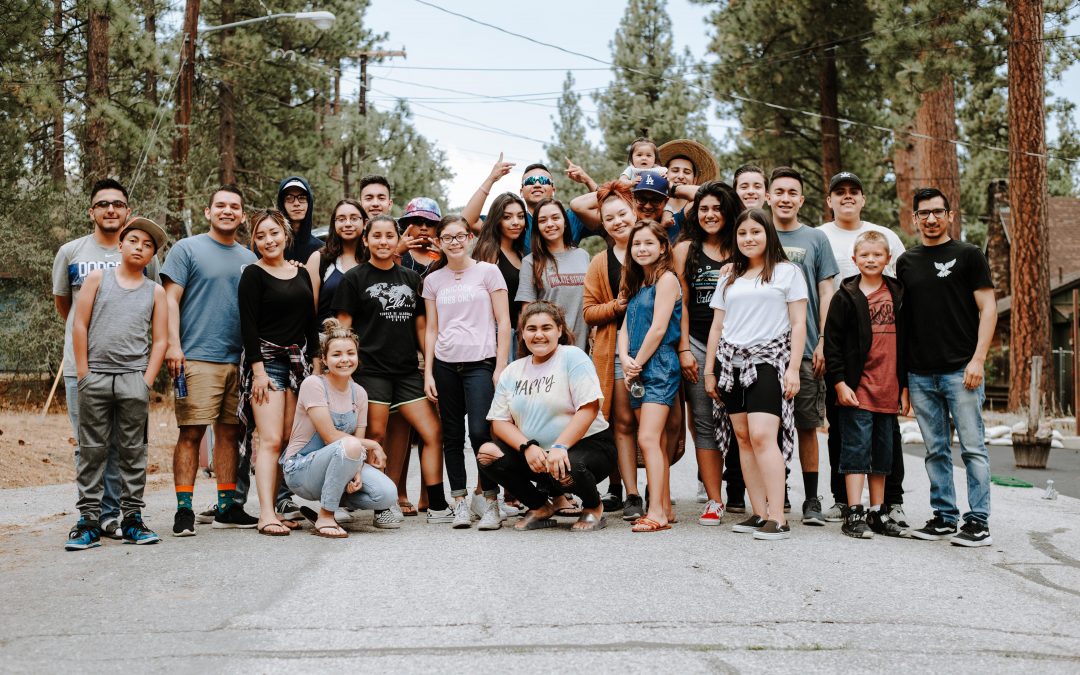
My Dream Ubuntu One Feature
I really dig [Ubuntu One](https://one.ubuntu.com/). I love the file sharing, the music store, the contact syncing, the music streaming, the bookmark syncing…I love how I can fire up a new computer and things get synced and I am good to go. I think the Ubuntu One team though are missing a huge opportunity that could bring tremendous innovation to Ubuntu and desktop Linux. But what is this glistening wreath of opportunity?

Not that.
It is *collaboration*. I know, those of you playing *buzzword bingo* just ticked a box, but bear with me.
Let me paint a picture as an example.
A few weeks ago a friend and I were on Skype and having a conversation about how we could solve a particular technical challenge. As the discussion got more and more complex, we knew we needed to resort to visual diagrams to keep on track. In other words: we both needed to collaborate together on a document.
So, we did what is natural for many Ubuntu users. I opened up Inkscape and created something and then had the idea of sharing it with him via Ubuntu One. I created a folder in my `Ubuntu One` directory, saved the file to it and shared it with him from Nautilus. Ubuntu One did it’s thing and immediately popped up a notification bubble to say the file was uploading. A few seconds later my buddy said he saw a notification bubble indicating that the file was syncing.
We were now in a great position. He opened up the file in Inkscape and viewed it. As our conversation continued he made some changes to the file and then saved. Because he saved to a shared folder, Ubuntu One automatically updated the new file in the share and my Ubuntu One downloaded the file automatically – without doing anything we were synced up. Rock and roll. At this point I then re-opened the file in Inkscape and I could see the new content. Wash, rinse, repeat.
The awesome thing about Ubuntu One is that all the technology is there for people to collaborate in this batch-processing kind of way, but it currently feels too manual in how you engage that sharing and collaboration. Ideally we want to build this right into apps using Ubuntu One as the back-end.
### The User Experience
This is what I would like to propose as the experience for the end user, and I will talk about the app developer experience soon. Please be warned: these mock-ups are crude and simplistic and would need the design and UI usability expertise of the design team to refine, but you should get the picture (pun intended) of the experience.
Imagine my friend and I are in the same position and wanting to collaborate together on a document. I would create the diagram in Inkscape and then click the File menu and see:
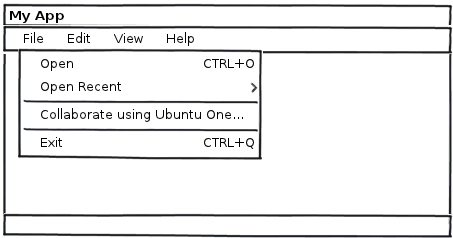
I would click on *Collaborate using Ubuntu One* (to be clear, this could be a different menu string, this is just an idea) and then you would see this:
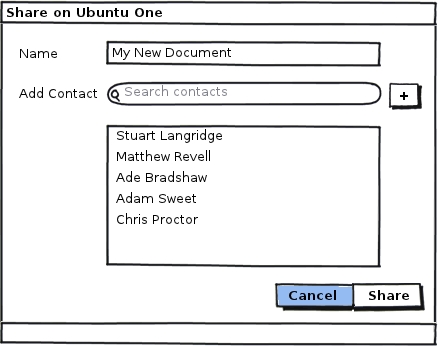
Here I can type in a name for the document (note, not a filename, a document name) and I can use the search box to select who I want to share it with. Entering a search term would search through my address book and I can select people to add to the share.
When I click *Share* each of the contacts I share the document with will get a message to ask them if they want to accept the share (this ideally would be a notification), such as:

At this point my friend could select the first option and view the file in Inkscape. Alternatively, he could click the *Preview* button to preview the file (if this is a document such as a PDF) or choose to accept the share and load it later.
If my friend would like to load it later, he could open Inkscape and select *File* -> Open and there would be a slightly modified Open dialog box:
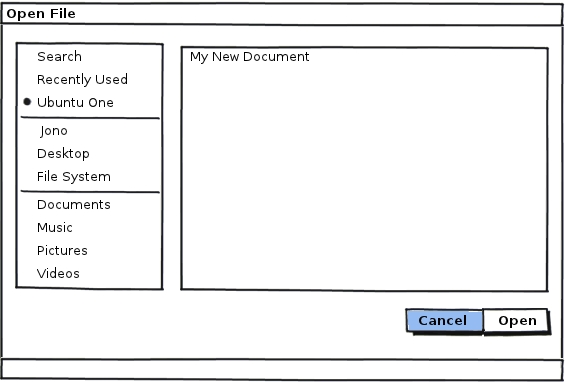
The only difference here is that there is an Ubuntu One option in the sidebar and when he clicks it, it just lists the documents shared that can be loaded into the app. The *Recent Documents* menu option in the File menu should also list Ubuntu One documents.
Now, here is a key point: if we both have the file open in our respective Inkscapes and one of us makes a change, the file would be automatically synced (which it does today), but also the application would automatically update the content and refresh the view to reflect the new version of the file. As an example, if I make a change to my document, the file would sync automatically over Ubuntu One and my friend’s Inkscape would reload the file to display the new content.
I believe this would offer a hugely compelling experience – it would allow people to collaborate using desktop tools, using Ubuntu One a seamless syncronization and storage service, and any new Ubuntu machine that you set up would have all your documents ready to roll.
### The Developer Experience
To achieve this from a developer perspective, the Ubuntu One team would need to provide an API for app authors to use to build this support into their apps. Ideally this would present a series of standard components that app authors can use to add this support in a really simple way.
As an example, I can imaging that I could use a Python module to add this support and then connect a menu item in my File menu to `sync_with_u1()` which would display the *Collaborate on Ubuntu One* dialog box (I could imagine there being `ubuntuone-api` as well as `ubuntuone-api-gtk` and `ubuntuone-api-qt` packages for the different pre-built dialogs). Upon the user entering content, the different values could then be passed to `process_u1_sync()`.
Ideally the app could then have some kind of listener built-in which could listen for a signal that indicates that the current Ubuntu One document has been updated and then trigger a method in the app that would reload the data and refresh the view.
It seems to me that the underlying infrastructure is all there to do this – all it would need is a thin Ubuntu One API and some standard dialog boxes (so that all apps have a uniform experience).
### Potential Uses
I can think of a variety of different methods in which people could collaborate using this batch-type functionality:
* Music – imagine this in Jokosher. I could create a project and record the drums, and then save to Ubuntu one and it would sync my project and all the recorded audio. Then a friend across the world could record a guitar piece and sync, and then I would get her performance. This could be a great way to make music together in a distribution manner.
* Video – the same approach to the music example above could be used for video.
* Documents – sharing office documents could be useful for reviewing documents, updating spreadsheets, reviewing presentations and more.
I am sure there are many more uses.
I am going to talk to the Ubuntu One team and see if this could be an option. I will keep my fingers crossed. 🙂
**UPDATE**: I have [registered a blueprint](https://blueprints.launchpad.net/ubuntu/+spec/community-ubuntuone-in-app-collaboration) and this will be discussed at UDS.

Ubuntu 11.04 Natty Narwhal Released

Today we released Ubuntu 11.04 Natty Narwhal, and you can [find out more about it](https://www.ubuntu.com/) and [download it here](https://www.ubuntu.com/download).
This has been a ferociously busy cycle and with it we set out with significant, audacious goals. We shipped a new shell, a new media player, significant improvements to [Ubuntu One](https://one.ubuntu.com/), and we worked hard to deliver all this change and opportunity in a predictable, stable and slick product. I am really proud of the result.
In this release we had over 320 developers contribute to it from both Canonical and the community, a new community of 17 new Unity contributors form, hundreds of translators translate Natty into 43 languages, countless LoCo teams get together for different global events and many other contributions made to documentation, testing, art, design, and more.
In short, out community came together and really delivered.
*Thankyou*.
Thankyou to everyone who shared their insights and skills to help make Ubuntu better for everyone. It is you all who are helping us to bring Free Software to the world, and I can’t think of a better family to be on this train with.
And now, we celebrate!

Ubuntu California Natty Release Party
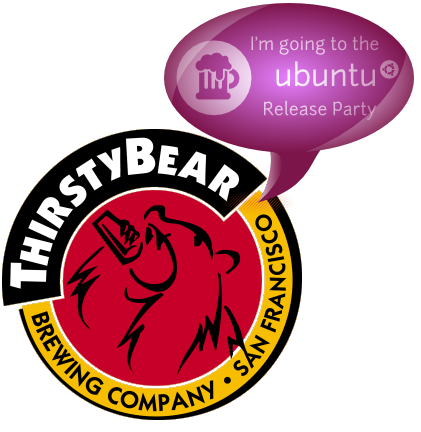
[Elizabeth](https://princessleia.com/journal/?p=4297) blogged it already, but I thought I would pump it through my loudspeaker too.
If you are in the San Francisco Bay Area on Thursday night (28th April at 7.30pm), be sure to head over to the [Thirsty Bear](https://www.thirstybear.com/) (661 Howard Street, San Francisco 94105) to join us for our Ubuntu 11.04 release party. It will be a pretty informal affair – just a get together in a bar/restaurant.
Feel free to just show up, and if you can [RSVP here](https://loco.ubuntu.com/events/team/920/detail/) that would be great too.
Oh, and to be 100% clear – everyone is welcome to the party. This is a celebration, and a celebration to welcomes everyone, whether you use Ubuntu or not; if you are not part of the Ubuntu community but would like to meet everyone, you are more than welcome!
Not in the San Francisco Bay Area? No problem, [find a release party near you](https://loco.ubuntu.com/events/global/744/detail/) – there are currently 60 events planned!
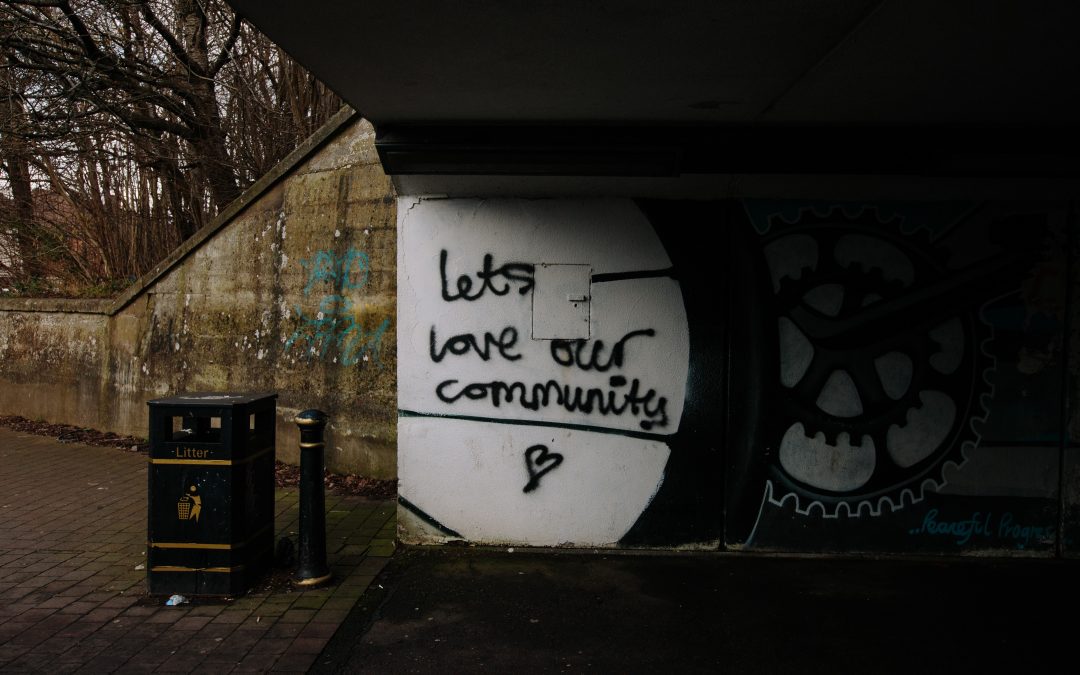
‘Help Me Be Better’ Meme
I have an idea for something that I think could be a fun little meme. I would like to encourage all of you to join in. All you need is a blog.
Let’s face it, *none of us* are perfect. We all have areas in which we can be better people and learn ways in which we can do better at what we do. From my experience we get better by being honest in our weaknesses and learn from constructive suggestions from our friends and colleagues. Our communities are a great place to experience this learning…they are filled with a wealth of experience and wisdom…so the meme is:
1. Blog about three things you feel are your weaknesses and summarize them. Express how you would like to improve.
2. As a reader, when you see one of these blog entries leave some constructive and encouraging suggestions for how the poster might be able to improve in that area.
The most important thing here is that we should all be *nice and friendly* in providing our suggestions to help the blogger improve in those areas.
So, to kick things off, here are my three areas in which I feel I have weaknesses:
1. **Cope with all my email better** – I have three different email INBOXes; my Ubuntu and Canonical addresses, my personal email address, and my Severed Fifth mail. Without wishing to portray myself as some kind of über-popular member of the glitterati, I get a *lot* of email. Frankly, more than I can handle. I have put together a fairly comprehensive process for handling email in which I read it, mark it for replying to, have filters for my team and closest colleagues, have calendared appointments for me to process email and more, but it still just keeps piling up. Some INBOXes I prioritize more than others, such as my Ubuntu/Canonical email, but this means the other ones suffer more than they should. I hate replying late to emails, but only have so many hours in the day, and I feel this is an area in which I could do better.
2. **Widen my approach to the community** – the Ubuntu community is a pretty huge place with lots of different teams covering lots of different types of contributions. In each release cycle myself and my team focus on a common set of teams. Unfortunately, I get so wrapped in my work with those set of teams that I often end up neglecting other teams. As an example, in Natty I worked with the accessibility team, Ayatana, developer teams, Desktop Experience team, Ubuntu One team, Ubuntu Women and some other teams, but I barely spent any time with the docs team, forums community, LoCo teams, Ubuntu Beginners team, testing teams and many others. If this happens to the same team for a few cyles I can end up going for quite some time without getting to know those communitty teams and what they are doing – I want to be able to spread my around better in a way in which I can still deliver on my commitments, but be less of a stranger to these other teams.
3. **Better multitasker** – I am the kind of person who starts to work on something and then I really get into it, and sometimes it is hard to break out of that mindset and multitask. As an example, I will really get into organizing an event or campaign, and throughout this period I will need to do some paperwork for something else. In some cases I will keep putting off the paperwork as I am pre-occupied with the bigger projects I am working on. This results in generally well delivered big projects but then a big pile of non-critical loose ends, and I don’t like having this pile of things left. I think I need to have a better mental capacity to multi-task; not the daily multi-tasking betweek email, IRC, calls, blueprints etc, but between different types of work and tasks.
Of course, I have many more weaknesses, so it took me a while to pick and choose. 🙂
Suggestions for improvement welcome, friends!

Ubuntu 11.04 Beta 2 Released: Test and Report!
Ladies and gentleman, boys and girls, [Ubuntu 11.04 Beta 2 is released](https://www.ubuntu.com/testing/natty/beta) and this will be the last development release before we unleash the final official lovable Narwhal into the wild on **Thu 28th April 2011**.
This means we have two weeks. Two important weeks for you all to download, test and file bugs. Now, I know what some of you are thinking:
> Naaa, I think I am just going to wait a few weeks for the final release to come out and then I will install it.
Quash such improper thoughts from your insightful minds and install the beta, test it and [file bugs](https://help.ubuntu.com/community/ReportingBugs).

Hindsight Is Almost 20/20
*Recently a friend of mine asked me to contribute to a free book that collates together the experiences of various people involved in Open Source. She asked me to write about what I would tell myself ‘if I knew what I know today’. I was pretty intrigued by this, so was happy to take part, and I asked if I could re-print my contribution here. She was happy with that, so here it is. It is quite long (because it is for a book), but it might be of interest, particularly for those of you interested in community management. Oh, and these are my views, and not the views of my employer, Canonical*.
I first learned of Linux and Open Source back in 1998. While the technology was gnarly and the effort required to get a smooth running system was significant, the concept of this global collaborative community transfixed me. Back then I had no knowledge, limited technical skills, and zits.
As an angsty teenager complete with long hair and Iron Maiden t-shirt, my path was really already mapped out for me in the most traditional sense; I would go to school, then college, then university, and then a job.
Fourteen years later, the path I actually took was by no means traditional, and that intrinsic fascination with community has taken me around the world and thrown me into some engrossing challenges. It is interesting to sit back and reflect on this period of time. Well, it might be interesting for me…you might want to skip to the next chapter… 🙂
…
Still with me? OK, let’s roll.
### Science vs. Art
I have always believed that community management is less of a science and more of an art. I define science as exploring methods of reproducing phenomena through clearly understood and definitive steps. In the science world if you know the theory and recipe for an outcome, you can often reproduce that outcome like anyone else.
Art is different. There is no recipe for producing an incredible song, for creating an amazing painting, or sculpting a beautiful statue. Similarly, there is not really any reproducible set of steps for creating a thriving community. Sure, there are tricks and techniques for achieving *components* of success, but the same happens for other art-forms; we can all learn the notes and chords on a guitar, it doesn’t mean you are going to write the next *Bohemian Rhapsody*. The formula that generates Bohemian Rhapsody is *one part learned skill and one part magic*.

*Sometimes magic plays a cruel joke on us*.
Now, I am *not* suggesting that community management is this frustratingly hip and introverted artform that only the blessed few with such talents can achieve. What *I am* instead lamenting is that there is no playbook for how to create a wonderful and inspiring community; it is still *one part learned skill and one part magic*, but the *magic part* is not divinely anointed to you by the gods, but instead obtained by trying new things, being receptive to feedback, and getting a feel for what works and what doesn’t.
Rather frustratingly, this means that there *is* no single recipe to follow for the magic, but there is still an opportunity to share the *learned skills*, as I have sought to do with [The Art of Community](https://www.artofcommunityonline.org/) and the annual [Community Leadership Summit](https://www.communityleadershipsummit.com/).
Before I get started reflecting, and for those of you who have not bored yourself into oblivion by following my career, I will summarize the communities I have worked with so we can define the context. In a nutshell, I started out in my hairier days by producing one of the UK’s first Linux community websites called Linux UK and got involved in the Linux User Group (LUG) community. I went on to create my own LUG in Wolverhampton in the UK and founded the Infopoint project to encourage LUGs to advocate Linux at computer fairs across the UK. I then went on to contribute to the [KDE](https://www.kde.org) community, founded the KDE::Enterprise site, got the KDE Usability Study going, and contributed to a few little apps here and there. I then founded the PHP West Midlands user group and started also getting interested in [GNOME](https://www.gnome.org). I wrote a few apps (GNOME iRiver, XAMPP Control Panel, Lernid, Acire) and also co-designed and wrote some code for a new simplified audio app called Jokosher. Around this time I co-founded the [LugRadio](https://www.lugradio.org/) podcast which would run for four years with over 2million downloads and spawning five live events in the UK and USA. At this time I also started work as an Open Source consultant at the government-funded OpenAdvantage where I really got a chance to cut my teeth in community and working with organizations across the West Midlands to help them to move to Open Source. After a few years at OpenAdvantage I moved on to join [Canonical](https://www.canonical.com) as the [Ubuntu](https://www.ubuntu.com) community manager and developed a team of four and together we are involved in a wide variety of projects in Ubuntu and Canonical.
Still with me?
Wow, you are persistent. Or bored. Probably bored. There will be an exam at the end; that’ll learn you… 🙂
### Reflecting
So this brings me to the focus of this piece – the curios question of *if I knew what I did today, what would I tell myself?* Over the course of my career so far I believe that everything I have learned can be boiled into two broad buckets:
* **Practical** – the tips and tricks of the trade; e.g. approaches to communication mediums, using technology in different ways, event planning techniques, project management approaches etc.
* **Personal** – core life lessons and learnings that affect the approach you take to your world.
I am not going to talk much about the *practical* – you should should [read my book](https://www.artofcommunityonline.org) for more on that topic (the book also covers *a lot* of the personal too).
Today I am instead going to focus on the personal life lessons. Approaches and practices will always change, but the life lessons don’t so much change but grow and evolve as we get wiser.

*Not wise.*
### The Importance Of Belief
Communities are fundamentally *networks of people driven by belief*. Every community has an ethos and a focus. This could be something as grandiose as documenting all human knowledge or changing the world with Free Software, or it could be as humble as providing a local group for people to get together to talk about their favorite books. Whether life changing or just a bit of fun, each community has a belief system; the humble book club still sees tremendous value in providing a fun, safe and free environment to share reading preferences and recommendations. It might not change the world, but it is still *a good thing* and something people can get behind.
The underlying often unwritten rule of community is that *every contribution from a community member must benefit the wider community*. This is why it is fun to write a patch that fixes a Free Software bug, contribute documentation, run a free event or otherwise, but it is rare that anyone is willing to contribute as a volunteer if their contribution only benefits a single person or company.
Of course, I am sure all of you cynical bastards are now going to try and find an exception, but remember that this decision is typically deeply personal – the community member decides how comfortable they are that their contribution will benefit everyone. As an example, some would argue that any contribution to [Mono](https://www.mono-project.com/Main_Page) would only benefit Microsoft and the ubiquity of their .NET framework, but hundreds of contributors participate in Mono because they don’t see it this way – they see their contributions as a valuable and fun way of making it easy to empower Free Software developers to write Free Software more easily.
If I was talking to the Jono of 1998 I would really emphasize the importance of this belief. I had a hunch about it back then, but I have since seen countless examples of belief truly inspiring people to participate. I have often talked about the story of the kid from Africa who emailed me to tell me how he would walk three hours to and from his nearest Internet cafe to contribute to Ubuntu. He did this because he *believed* in our mission to bring Free Software to the masses. The same can be said for the tremendous growth in [Wikipedia](https://www.wikipedia.org/), the incredible coming together of the GNOME community around GNOME 3, the success of [OpenStreetMap](https://www.openstreetmap.org/) and many other examples.
Belief though is not a PR stunt. It has to be real. While each of us has different belief systems, some map their belief systems to software, some to education, some to knowledge, some to transparency or whatever else, you can’t concoct a belief system unless it serves a valid goal that a group are likely to care about. Sure, it can be obscure, but it has to be *real*. With the success of Open Source, we have seen some examples of some companies trying to use similar language and approaches around belief, but applying it to self-serving needs. I could invent a belief of “*let’s all work together to help Jono get rich*” and concoct some nonsense of the benefits of this belief (e.g. if I am rich I can focus on other work that would benefit other communities, my future kids would get a wonderful education and upbringing and this will benefit the world), but it would be rubbish.
*No one wants to be this guy. Or that guy.*
As such, belief is a strong driver for collaboration and contribution, but it must be met with respect and balance. While it can be a trigger for incredible change, it can also be hugely destructive (e.g. some television preachers who use religion as a means for you to give them money, or fake psychics who use cold reading to latch onto your belief to desperately try and re-connect with a lost loved one).
### Your Role
Community managers play an interesting role these days. In the past I have talked about there being two types of community managers; those who go out and give presentations and wave their hands around talking about a product or service, and those who work with a community of volunteers to help them to have a fun, productive and enjoyable collaborative experience. I am more interested in the latter – I feel that is what a *real* community manager does. The former is a fine and respectable position to have, but it is more in the area of advocacy and public relations, and requires a different set of skills. I have a few tips here I think are interesting enough to share.
The first and probably most important lesson is having a willingness to accept that you *can and will be wrong sometimes*. In my career so far I have got some things right and some things wrong. While I believe I am generally on the right path and most of my work is successful, there have been a few turkeys here and there. These screw-ups, mishaps and mis-steps have never been out of maliciousness or carelessness, they have instead typically been from me overshooting the target of what I was trying to do.
This seems like a pretty obvious point, but it gets less obvious when you have a fairly public role. By and large, community managers are often seen as representatives of a given community. As an example, I know that I am personally seen as one of the public faces of Ubuntu, and with that responsibility comes the public pressure of how people perceive you.
For some community leaders, having the spotlight shone on them causes a defensive mechanism to kick in; they cringe at the idea of making mistakes in public, as if the chattering masses expect a perfect record. This is risky, and what has been seen in the past is that we get public leaders who essentially never accept that they have made a mistake due to this fear of public ridicule. This is not only a fallacy (we *all* make mistakes), but it also doesn’t set a good example to the community of a leader who is honest and transparent in both the things they do well and the things they do less well. It is important to remember that we often gain respect in people *because of their acceptance of mistakes* – it shows a well rounded and honest individual.

Not entirely rounded.
I remember when I first became a manager at Canonical and at the time Colin Watson and Scott James Remnant, two original gangstas from the very beginning of Canonical and Ubuntu, were also managers on the Ubuntu Engineering Team. We would have our weekly calls with our manager, Matt Zimmerman, and on these calls I would hear Colin and Scott openly accepting that they were not good at this, or had made a mistake with that; they were stunningly humble and accepting of their strengths and weaknesses. As a rookie manager I was a little more tight-lipped, but it taught me that this kind of openness and honesty is not only good as a manager but as a community leader and since then I feel no qualms in publicly admitting to mistakes or apologizing if I screw up.
### Listening
In a similar way, while openness to mistakes is important, another lesson is the importance of being a good listener and learning from our peers. In many cases our communities look to community managers and leaders as people who should always be providing guidance, direction and active navigation of the project and it’s goals. This is definitely a responsibility, but in addition to the voicing of this leadership, it is also important to be a passive listener, providing guidance where appropriate and learning new lessons and insight.
Our community members are not just cold, hard, machines who perform work; they are living, breathing, human beings with thoughts, opinions, feelings and ideas. I have seen many examples, and I have accidentally done this before myself, where someone is so used to providing guidance and direction that they sometimes forget to just sit down and listen and learn from someone else’s experience. Every industry is filled with thought leaders and scholars…famous people who are known for their wisdom, but in my experience some of the most revolutionary life lessons that I have learned have come entirely from non-famous, day-to-day, meat-and-potatoes community members. Being a great listener is not just important to help us learn and be better at what do, but it is critical in gaining respect and having a great relationship with your community.
### On vs. Off Time
While on the subject of how we engage with our community, I have another take-away that I only truly processed in my own mind fairly recently. Like many people, I have a number of different interests that fill my days. Outside of being married and trying to be the best husband I can be, and my day job as the Ubuntu Community Manager, I also have projects such as [Severed Fifth](https://www.severedfifth.com), the [Community Leadership Summit](https://www.communityleadershipsummit.com/), and some other things. As you would naturally expect, my days are committed to my day job – I don’t spend time at work working on these other projects. As such, as you would naturally expect, when my work day ends I start working on these other projects. The lesson here is that *it is not always clear to your community where the lines are drawn*.
Over the years I have developed a series of online facilities that I use for my work and viewpoints. My [Twitter](https://twitter.com/jonobacon), [identi.ca](https://identi.ca/jonobacon), [Facebook](https://www.facebook.com/jonobacon) pages, [this blog](https://archivedblog.jonobacon.com), and some other resources are where I talk about what I do. The challenge is that if you take into account these public resources, my public representation of the Ubuntu project, and the wealth of timezones across the world, it does not take an Einstein to confuse whether I am writing about something as a Jono thing or a Canonical thing.

*”Einstein was best known as a badass Hungry Hippos player”. [citation needed]*
This has caused some confusion. As an example, despite my repeated clarifications, [OpenRespect](https://openrespect.org/) is not and never has been a Canonical initiative. Of course, some idiots choose to ignore my clarification of this, but I can see how the confusion could arrive nonetheless. The same thing has happened for other projects such as *Severed Fifth*, *The Art of Community* and the *Community Leadership Summit*, of which none are, or ever have been part of my work at Canonical.
The reason why I consider this a lesson is that I have seen, and at one point shared the view that “*of course it is a spare time thing, I posted that at 8pm at night*” and shrug of concerns of the lines blurring. When you have a job that puts you in a reasonably public position, you can’t have the luxury of just assuming that; you have to instead assume that people are likely to blur the lines and you have to work harder to clarify them.
### Don’t Travel Too Much
On the topic of working for a company that employs you to be a community leader, you should always be aware of the risks as well as the benefits of travel. This is something I learned fairly early on in my career at Canonical. I would see the same faces over and over again at conferences, and it was clear that these folks had clearly communicated the benefits of travel to their employer, as I had done, but I also came to learn the risks.
I would travel and it would not only be tiring work and emotionally exhausting, but I would also be away from my email more, on IRC less, unable to attend many meetings, and have less time to work on my work commitments. As such, my role would largely become that of getting out and visiting events, and while fun, this didn’t serve my community as well as it should have done. As such, I fairly dramatically cut my travel – if fact, I went to the Linux Collab Summit a few days ago, and outside of Ubuntu events that I needed to attend, I had not made it to conference for a nearly a year. Now I feel the pendulum has swung a little too far in the other direction, so it is all about balance, but I also feel I serve my community better when I am able to take to the time to be at the office and be online and accessible.
### Planning
For some folks, the role of a community leader or community manager is one that is less about pre-disposed structure and instead more interrupt-driven. When I started out, I used to think this too. While there is absolutely no doubt that you do indeed need to be interrupt-driven and able to respond to things that are going on, it is also essential to sufficiently plan your work for a given period of time.

*Apparently, awesome at laying plans.*
This planning should be done out in the open where possible and serves a few functions:
* **Shares plans** – it helps the community to understand what you are working on and often opens up the doors for the community to help you.
* **Assurances** – it demonstrates that a community leader is doing something – your community can see your active work happening. This is particularly important, as much of the work of a community leader often happens out of the view of the wider community (e.g. having a one-on-one conversation with a community member), and this lack of visibility can sometimes generate concerns that little is happening in key areas, when instead a lot is going on behind the scenes.
* **Communicates progress up and down the ladder** – this is relevant if you are working for a company – having some solid planning processes in place demonstrates your active work to your management, and it also re-assures your team that they will always know what to work on and create great value for the community.
Over the years I have put more and more importance in planning, while still retaining enough time and flexibility to be interrupt-driven. When I started as the Ubuntu Community Manager my planning was fairly personal and ad-hoc – I took the pulse of the community, and I applied my time and resources to tend to those areas as I saw fit.
Today I break goals into a set of projects that each span an Ubuntu cycle, gather input from stakeholders, put together a roadmap, track work in [blueprints](https://blueprints.launchpad.net/), and assess progress using a variety of tools and processes such as my [burndown chart](https://people.canonical.com/~pitti/workitems/natty/canonical-community.html), regular meetings, and more. While the current approach requires more planning, it helps significantly with the benefits covered in the above bullet points.
### Perception and Conflict
One thing I often hear about in the world of community management and leadership is the view that *perception is everything*. Typically when I hear this it is in response to someone getting the wrong end of the stick about something, often in a conflict period.
Of course, perception *does* indeed play an important part in our lives, but what can fuel incorrect or misaligned perceptions is lack of information, mis-information, and in some cases, heated tensions and tempers. This can be some of the most complex work for a community leader, and I have come away with a few lessons learned in this area too.
Communities are groups of people, and in every group there are often common roles that people fill. There is usually someone who is seen as a rockstar and hero, someone who is sympathetic to concerns and worries and a shoulder to cry on, someone who is overtly outspoken, and often someone who is…well…deliberately difficult. Heroes, sympathetic ears and outspoken folks are not particularly challenging, but deliberately difficult people can be complex; if someone is being overtly difficult to deal with, it can cause tensions to form with other members and bring conflict to an otherwise happy community. We need to nip those issues in the bud early.

*Not how you nip something in the bud.*
Part of the challenge here is that people are people, groups are groups, and it is not uncommon for a single person or a few people to become known and complained about behind closed doors as difficult to work with. In addition to this, most people don’t want to get involved in any conflict, and as such the person being complained about can sometimes never actually know that people see them this way, as no-one wants to confront them about it. This results in one of the most dangerous situations for a community members – a reputation is spread, without the knowledge of the person who it applies to, and because they never know, they never have an opportunity to fix it. That is a pretty sucky position to be in.
A common response to this conclusion is the view that “*they are so difficult to deal with that trying to reason with them will fall on deaf ears anyway*”. While this certainly does happen from time to time, don’t be so quick to assume this will be the outcome; there has been a few times when I have had the uncomfortable experience of feeling I need to share with someone the reputation that they have developed, and in virtually all cases it has been a real surprise to them, and they have almost all modified their behavior based on the feedback.
On a related note, while often not a common part of the daily routine of a community leader, conflict will often raise it’s head here and there. I just wanted to share two brief elements about conflict.
The first is understanding how conflict forms. To introduce this, let me tell you a little story. Last week a friend of mine flew out to the Bay Area for a conference. He arrived in the evening, so I picked him up from the airport and we went to the pub to catch up. While there he started telling me how disappointed he was with Obama and his administration. He cited examples of health care reform, Wall Street reform, digital rights and more. His agitation was not with the policies themselves, but with Obama not doing enough. My perspective was a little different.
I am not a democrat or a republican; I make my decisions on each issue, and I don’t align myself with either party. Where I differ to my friend though is that I am a little more sympathetic to Obama and his daily work. This is because I believe that he, and anyone else in a public position, whether as internationally recognized as the president, or as obscure and specific as a community manager, realizes that the story read and understood by the public is often only a fragment of the full story. There has been cases in the past where something controversial has kicked off in the communities that I have been a part of, and many of the commentators and onlookers have clearly not had a full knowledge of the facts either because they have not picked up on the nuances and details of the topic or some parts of the story have not been shared.
Now, I know what some of you are going to say – some parts not shared?! Surely we should be transparent? Of course we should, and we should always strive to be open and honest, but there are some cases when it would be inappropriate to share some parts of the story. This could be because of private conversations with people who don’t want their comments shared, and also just being classy in your work and not throwing dirt around. As an example, I have always had a very strong policy of not throwing cheap shots at competitors, no matter what happens. In the past there has been some questionable behavior from some competitors behind the scenes, but I am not going to go out and throw dirt around as it wouldn’t serve a particularly useful purpose, but with that I have to accept that some community critique will only have part of the picture and not be aware of some of the behind the scenes shenanigans.

*Not a competitor*.
Finally, on the topic of conflict, I believe a real life lesson I have learned has been the approach in which critique and successful outcomes should be approached. Although blogging has had a hugely positive impact on how people can articulate and share opinions and perspectives, there has been a dark side. Blogging has also become a medium in which much overzealous opinion can sometimes be expressed a little too quickly. Unfortunately, I have a rather embarrassing example of someone who fell into this trap: yours truly.
First, a bit of background. There used to be a company called Lindows that made a version of Linux that shared many visual and operational similarities to Windows. Microsoft frowned at the name “Lindows,” and a fight started to change the name. Lindows initially resisted, but after mounting pressure, changed their name to Linspire.
Now to the issue. Let me take the liberty to explain in the words of the article itself:
> Recently a chap named Andrew Betts decided to take the non-free elements out of Linspire and release the free parts as another Linspire-derived distribution called Freespire. This act of rereleasing distributions or code is certainly nothing new and is fully within the ethos of open source. In fact, many of the distributions we use today were derived from existing tools.
> Unfortunately, Linspire saw this as a problem and asked for the Freespire name to be changed. Reading through the notice of the change, the language and flow of the words screams marketing to me. I am certainly not insinuating that Betts has been forced into writing the page, or that the Linspire marketing drones have written it and appended his name, but it certainly doesn’t sound quite right to me. I would have expected something along the lines of “Freespire has been changed to Squiggle to avoid confusion with the Linspire product”, but this is not the case. Instead we are treated to choice marketing cuts such as “To help alleviate any confusion, I contacted Linspire and they made an extremely generous offer to us all”. Wow. What is this
one-chance-in-a-lifetime-not-sold-in-stores offer? Luckily, he continues, ‘they want everyone who has been following my project to experience ‘the real’ Linspire, FOR FREE!!!”. Now, pray tell, how do we get this “real” version of the software “FOR FREE!!!”?
> “For a limited time, they are making available a coupon code called ‘FREESPIRE’ that will give you a free digital copy of Linspire! Please visit https://linspire.com/freespire for details”. Oh…thanks.
I gave Linspire a pretty full-throated kick in the wedding vegetables in my blog entry. I told the story, objected to what I considered hypocrisy given their own battle with similar-sounding trademarks, and vented. I wish Guitar Hero had existed back then: it would have been a better use of my time.
I was wrong. My article was never going to achieve anything. Shortly after the article was published, then-CEO Kevin Carmony emailed me. He was not a happy bunny. His objection, and it was valid, was that I flew off the handle without checking in with him first. My blog entry was my first reaction. The reality of the story was far less dramatic, and Linspire were not the ogres that I painted them to be. I apologized to Kevin and felt like an idiot.
Many conflict scenarios are resolved in private discussions where people can be open and focus on solutions without the noise. Over the years I have seen many examples of a furious public blogging war going on while behind the scenes there is a calm exchange of opinions and the focus on solutions.
### Wrapping Up
When I started writing this it was much shorter, but I just kept adding one more thing, and then one more thing and so on. It is already long enough that I can probably count the number of people reading this bit on one hand, so I am going to hang it up here. I could go on forever with little tidbits and experiences that I have been fortunate enough to be involved in and expand my horizons, but then I would end up writing *The Art of Community II: This Time Its Personal*.
Life is a constant on-going experience, and I hope your investment in reading this has added to it a little. I look forward to hearing from your experiences in the comments.

Community Leadership Summit 2011

The [Community Leadership Summit 2011](https://www.communityleadershipsummit.com/) is the third incarnation of the popular **free** event designed to bring together community leaders and managers and the projects and organizations that are interested in growing and empowering a strong community. It takes place from **23rd – 24th July 2011** in **Portland, Oregon** and is the weekend immediately before [OSCON](https://www.oscon.com/oscon2011), so this is a great chance to join both events in the same trip!
The event provides an unconference style schedule in which attendees can discuss, debate and explore topics. This is augmented with a range of scheduled talks, panel discussions, networking opportunities and more.
The event provides the first opportunity of its kind to bring together the leading minds in the field with new community builders to discuss topics such as governance, creating collaborative environments, conflict resolution, transparency, open infrastructure, social networking, commercial investment in community, engineering vs. marketing approaches to community leadership and much more.
### Why Go?
CLS brings together community managers and leaders from all different walks of life. We already have been registered who are coming from Rackspace, Open Source Bridge, Microsoft, Oracle, MySQL, MeeGo, Xen, Adobe, O’Reilly, Eucalytpus, Google, Stanford University and more. It is a great environment to meet new people, have some great discussions, and have a great time.
### Register and Keep Up To Date
The Community Leadership Summit is entirely free to join, but we ask everyone to register. You can register [by clicking here](https://cls11.eventbrite.com/).
You can also keep up to date by joining the [Facebook Event](https://www.facebook.com/event.php?eid=196907063655463) – be sure to say you are coming. 🙂
### Sponsorship
We are currently looking for companies who may be interested in sponsoring the event. If you are interested, please email me.

Congratulations on GNOME 3!

I am about to head out to the Linux Collaboration Summit, so I won’t be online when GNOME 3 hits the tubes in a few hours, so I just wanted to offer my congratulations in advance to the GNOME 3 team for their wonderful achievement in delivering [GNOME 3](https://www.gnome3.org). 🙂
As many of you will also remember, GNOME 3 was something of a pipe dream when it was discussed way back at GUADEC in Stuttgart. With each following GUADEC the discussions would continue and at one point it felt like GNOME 3 would never happen, but in the last few years it has been incredible to see how the community really came together to form around a vision an not just deliver on it, but *really* deliver on it. The last few months in particular have demonstrated a feverish commitment to delivering a solid release, and this work has not just involved developers, but designers, marketing folks, web developers, advocates, testers, artists and more. Everyone has done such a wonderful job, and I just wanted to have a specific shout out to Jason Clinton for the videos on the [website](https://www.gnome3.org/) – awesome work!
Anyway, you folks should be celebrating, not reading my inane ramblings – go and crack open a beer and reflect on the success of delivering GNOME 3. Today is a clear indication that GNOME is stronger than ever. Have a great day, folks!

ShipIt Discontinued, Long Live LoCo Teams
Today it was [announced](https://blog.canonical.com/?p=551) that ShipIt, the free CD service that Canonical has been running since the inception of Ubuntu will be discontinued. I know some [LoCo Teams](https://loco.ubuntu.com) may be worried about this, so I wanted to clarify some details right away.
* **Why?** – a few reasons. Firstly, CD distribution is not really as effective as it used to be, and it is expensive. These days, particularly with the availability of low cost hi-speed Internet growing across the world, more and more people are simply downloading the ISO images and burning them to a CD or installing from a USB stick. Canonical felt like it would make better sense to reduce the investment in snail-mail CD distribution and focus it more on LoCo Teams and use those savings to invest in other areas of the project.
* **What about LoCo Teams?** – here is the key point – **we are still going to provide Approved LoCo Teams with CDs**! We recognize the hugely valuable contribution LoCo teams make in advocating Ubuntu and helping people to use it and enjoy the freedoms in it, and we will continue to provide Approved LoCo teams with CDs that they can use for this advocacy work. As before, we encourage these CDs to be shared and re-used – Ubuntu CDs sat in a closet gathering dust don’t benefit anyone! Get the CDs, share them and re-use them. 🙂
* **How do LoCo Teams get CDs?** – there is a new form to fill in. Simple [go here to request your CDs](https://forms.canonical.com/lococd/).
* **Why can only approved LoCo teams get CDs?** – the provision of free CDs from Canonical is an expensive service intended to empower LoCo teams in spreading the word of Ubuntu. Approved LoCo teams have demonstrated *significant and sustained* contributions in this area and based on this strong reputation we trust those resources won’t be wasted. Non-approved teams have not yet built that reputation, but when they do and get approved, they are welcome to apply for CDs too.
Alright, I think that covers the main points. Any questions, feel free to ask in the comments. 🙂

Natty In The Final Stretch: A Retrospective
*This is a personal post and does not necessarily represent the views or opinions of my employer, Canonical*.
Wow, what a cycle the Ubuntu 11.04 Natty Narwhal one has been. When we set out on this mission back in October 2010 there were uncertain waters ahead of us. We were proposing Unity for inclusion in our main Ubuntu desktop version, and we knew this was a significant undertaking that touched a lot of teams and people. As we race towards the release of Ubuntu 11.04 Natty Narwhal on the 28th April 2011, I am proud of the progress everyone has made. It has been a cycle where we all knew we needed to come together as a community to deliver, and many people have played a key role in that success so far.
Delivering Unity in 11.04 was a pretty ambitious goal; not just a case of deploying it into the distribution, but it needed to be ported to Compiz (after we experienced some performance issues with it’s previous mutter/clutter base), accessibility support needed building in, new designs needed to be implemented, and Unity needed to meet the high quality standards that our users should expect. In the words of Stiffler, it was “*on like Donkey Kong*” for 11.04.
### Joining The Dots
From a public perspective, most curious onlookers would only assess the raw software development machinery of this work; tasks such as making Unity fast and stable, porting it to Compiz, building in features and accessibility etc. It is easy to assess this work; keep an on the [Launchpad project](https://launchpad.net/unity) and the [bug list](https://bugs.launchpad.net/unity/+bugs?orderby=-heat&field.status%3Alist=NEW&field.status%3Alist=INCOMPLETE_WITH_RESPONSE&field.status%3Alist=INCOMPLETE_WITHOUT_RESPONSE&field.status%3Alist=CONFIRMED&field.status%3Alist=TRIAGED&field.status%3Alist=INPROGRESS&field.status%3Alist=FIXCOMMITTED&field.omit_dupes=on), read the news sites, hang-out in `#ayatana` on Freenode and get a general feel for the work going on.
There were though many internal Canonical team management and coordination tasks to achieve. Unity is not produced by one team – the Design Team, Desktop Experience Team, Ayatana Contributors, Ubuntu Platform Team, Ubuntu Accessibility Team, Community Team, Multitouch Team and QA Team all have a piece in this jigsaw puzzle, and as engineering managers, we set out to ensure these teams were all aligned like cogs in a smooth-running machine.

*Holy confusion, Batman! How many metaphors does Bacon need to use in every blog post?!*
It is a pretty comprehensive challenge to ship a new Operating System every six months, and when you have this many teams working together to deliver a single consistent product, it requires some careful coordination. Sure, there were some snafus and some crossed-wires at times, but by-and-large, the teams worked exceptionally well together. Credit goes to the team leads for ensuring these lines of communication were clear.
### Rollin’
At the beginning of the cycle Unity was something of a blank canvas. *Jason Smith* had already done some work in porting it to Compiz, and I remember Jorge and I intently looking forward to the first drop of it in the distribution. When it eventually landed in Natty it was heavily broken, Compiz constantly crashed, and it had a fraction of the functionality it has now. It was broken, but it was a *start*. Now the team could keeping revving on it.
Thus started the weekly cadence by Desktop Experience team, led by *David Barth* and *Duncan McGreggor*, and the Ubuntu Desktop team, led by *Jason Warner*. With it, the Desktop Experience team would feverishly work all week on functionality and bug fixes and every Thursday *Didier “didrocks” Roche* and co. from the Desktop Team would package Unity and upload it into Natty.

*You read `didrocks` on IRC, but your mind sees this guy.*
Step by step, features landed…the Launcher…the Indicators…the Lenses…the Dash…and more. We would see the details starting to form; little niceties such as only showing compatible apps when dragging a file onto the Launcher, the window management features, and the Launcher progress bars and emblems. We saw the performance solidifying in the Lenses and Dash. We saw little bits of fit and finish forming, and while Compiz crashers were a common source of complaints from early Natty testers, *Sam “SmSpillaz” Spilsbury* worked around the clock to get them fixed and bring the stability that even our development branch users have come to expect in Ubuntu.
While all of this was going on, I was also taking Unity and it’s success very seriously in my own team. Aside from having weekly calls with some community teams and helping the different team leads to ensure the lines of communication were flowing smoothly, my team was focused firmly on community growth.
At the start of this cycle I tasked *Jorge Castro* with a very specific set of objectives. That is: I wanted him to work on growing the Unity contributor community. This task involved a range of different components – I had built [unity.ubuntu.com](https://unity.ubuntu.com) to get him started, but I asked him to ensure the contributor workflow was well documented and simplified and to regularly reach out and inspire people to contribute. At the heart of this campaign I wanted to see a continuation of the *making Ubuntu more personal* meme that I kicked off at the last Ubuntu Developer Summit, and to build on the cadence approach that has become commonplace in the Ubuntu community.
The result of this was the [Unity Bitesize Bugs](https://wiki.ubuntu.com/Unity/Bitesize) campaign – a weekly set of simple and easy to fix bugs that help new contributors get started easily. Ever since Natty opened up for development, we were steadily growing a community of testers who would test all aspects of the new code that was landing and providing a solid bug list for the Unity developers to work on. The goal was to take this bug list, tease out which ones are great for new contributors to get start with, and build awareness around those bugs. Kudos to *Alex Launi* for some stellar bug triage work in this ares; a man so capable, he could be confused for a bot. It’s happened before with other people. Really.

*Happiness is typing `ubuntu-bug unity` into a terminal”.*
The Unity Bitesize Bugs campaign was built on top of new documentation, simple instructions for how to participate, and a weekly set of blog posts that encouraged participation and celebrated the success of those who did. Jorge did a *wonderful* job with this work. He created these resources, reached out to new community members, and showcased these personal stories. It was wonderful to see new folks getting excited about the technology and joining the Ayatana and Ubuntu family.
The result of this work has been a significant number of new contributors participating in Unity and Ayatana, more activity in `#ayatana` on freenode, [a constant stream of merge proposals](https://code.launchpad.net/unity/+activereviews), and the Unity experience getting better every day for everyone. Thank-you to everyone who has participated and continued to be a part of our community!
On the 24th Feb 2011 we hit Feature Freeze and the team shifted their focus from feature development to bug fixing. Each week the team would dig through the Unity bug list contributed by testers throughout the Natty cycle and focus on the most important bugs. On average each Unity release fixes around 60 bugs a week. Pretty impressive work, and testament not only to the work going on in the Desktop Experience team and by our community contributors, but also the global Natty testing community who have been diligently upgrading each week, testing, and filing bugs.
This weekly cadence and the strong focus on bug fixing has resulted in Unity in Natty getting steadily more and more stable and efficient. It really feels like everything is really solidifying – there is still lots to do, but we are getting there.
### Moving Forward
Today is Mon 4th April and we still have three weeks until we release. Already Unity in Natty is feeling great, and I have little doubt that as the team drills through the bug list Unity will continue to feel more and more consistent. I am confident Natty is going to be a great release. Sure, there will still be some bugs – no software is ever perfect – but I personally will be satisfied that everyone with a position of influence on Natty (such as all the folks I have mentioned thus far), will have given their level-best to help make Natty a success.
Software is software, and while exciting, what excites me personally about Natty is actually not the software. The goals and focus of Natty is what I have been dreaming about since I got involved in Open Source – to take the value and opportunity of collaborative community and to work together to make technology better to help make people’s lives better.
Linux has always traditionally served the needs of technical types such as myself very well, and that is *awesome*. One of the reasons I got interested in Linux was that I had a *full-blown UNIX on my computer*. I loved that the technology wasn’t hidden from me. I remember when I was eighteen I would print out directory listings of important system directories such as `/etc` and go through each file one by one and learn what the file did. It helped working in a computer bookshop with little to do, lots of Linux books, and a boss that had no interest in making any of us work. I used it as an opportunity to learn, and it was a real adventure for me – I would literally stay awake at night thirsting for more knowledge.
This period always reminds me a little of this gem from XKCD:
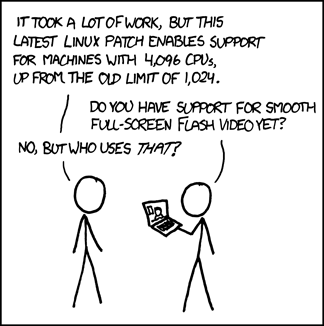
*Sound familiar?*
While this wonderful sense of technical freedom is a thrill for many of us, and it is certainly a very valid product of the freedom we celebrate in our technology, it is *not* for everyone.
My primary motivation has always been in bringing freedom to those folks who don’t have the technical expertise and interest that we have; the mums and dads, auntie’s and uncles, school kids, teachers, small business owners, charity workers, and others who consider computers a tool and not a *philosophy*. While I get a real kick seeing people enjoying using Ubuntu and enjoying the technology and how it is put together, what really gets my engines running is seeing Free Software delivering access to technology and information for folks who haven’t got the first idea of what the software is or how it works. For me, technology that serves a very non-technical benefit (such as learning, getting access to healthcare information, or helping someone to express their creativity or spirit) is a wonderful outcome of what many of us can bring to the fold.
This is a *huge opportunity* for Free Software; to build a solution for these end-users; a solution that distills the freedoms we often celebrate in the Free Software world such as transparency, openness, standards, and collaboration, in a form where these users purely feel the benefits. This is not a one horse race. I am delighted that this is an opportunity that many of us are aiming for, be it Ubuntu with Unity, Fedora with GNOME Shell, Elementary, the KDE team, or any other projects for that matter.
### The Complete Package
What excites me specifically about Ubuntu 11.04 is that it feels like the pieces are coming together. There has been a lot of talk recently about shells, such as Unity and GNOME Shell, but the shell is really only a *tiny part of the puzzle*. While the shell needs to deliver a great experience, so does the installer, the ability to browse and install apps easily, access social networking, send email, listen to music, watch videos, create new content and more. I really feel like Ubuntu is getting to a point where the experience of these different elements is by-and-large sheened to the point where most of the end-user demographic that I have been speaking about could get by with ease.
Of course, and as I am sure you cynical buggers will point out, there are deficiencies, bugs, and problems. There always will be — this is software — but I feel we are getting to the point at which the whole is really projecting an image and experience much more than the sum of it’s parts. I have often felt similar about previous releases, but it feels much more prevalent and tangible in Unity.
I am excited, and I am thankful to every one of you folks who has the same dream – to bring Free Software to everyone and help change people’s lives in the process and them that little bit better. 🙂
